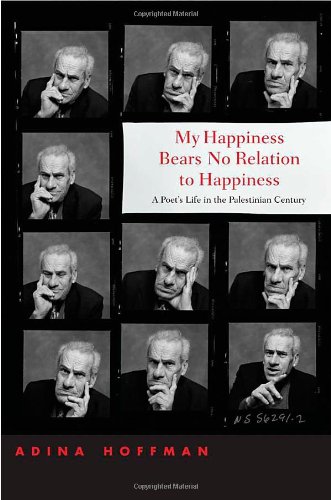
My Happiness Bears No Relation to Happiness
A Poet's Life in the Palestinian Century
کتاب های مرتبط
- اطلاعات
- نقد و بررسی
- دیدگاه کاربران
نقد و بررسی

Starred review from January 26, 2009
That his happiness bears a strong relationship to dispossession and exile makes Israeli Arab poet Taha Muhamad Ali, subject of this luminous biography, an iconic voice of the Palestinian consciousness. The 17-year-old Taha and his family lost their home when the Israeli army captured and demolished their village, Saffuriyya, in 1948. After a lifetime spent running a souvenir shop in Nazareth, he has recently won international acclaim for his poetry. Intersecting his perceptions with Hoffman’s own account of the Palestinian-Israeli conflict (which sometimes favors the Palestinians), Israeli-American essayist Hoffman (House of Windows: Portraits from a Jerusalem Neighborhood
) uses his story as the starting point for a painterly reconstruction of the lost world of Saffuriyya and its diaspora. Hoffman is a perceptive reader of Taha’s work (which she places in the context of a dynamic Palestinian literary scene) , appreciating its formal inventiveness, its dapplings of melancholy and exuberance, and its grounding in the pungent details and vernacular of village life. Looking past the usual strident politics, Hoffman presents readers with a subtle, moving evocation of the human realities of the Palestinian experience, rooted in land and memory. Photos.

February 1, 2009
The life and incendiary times of Palestinian poet Taha Muhammad Ali, a secular Muslim and autodidact who lives in Israel, runs a souvenir shop in Nazareth and has somehow achieved and maintained an ecumenical, humane philosophy.
Ibis Editions founder and editor Hoffman (Houses of Windows: Portraits from a Jerusalem Neighborhood, 2000) met Ali in 1995 with her husband Peter Cole, the poet's principal English translator. Since then she has pursued his story—not an easy task for an American-born Jew living in Jerusalem who initially knew no Arabic. During the past 13 years, she has learned the language, prowled civilian and military archives, walked the ground and interviewed countless individuals, probing their memories of cataclysmic events occurring more than a half-century ago. The result is not just a biography of a remarkable man, but a focused history of a region. Hoffman realizes the vast importance of displacement in Ali's story, most significantly during the 1948 war following the United Nations partition. That war resulted in the destruction of the poet's home village, Saffuriyya, and sent the 17-year-old and his family into temporary exile in Lebanon. There they suffered unspeakably with thousands of other refugees; Ali was separated from his betrothed and did not see her until decades later, when both had married others. His family returned to the land now called Israel in 1949; they were not allowed to go back to the ruins of their village and endured other severe restrictions. Possessing little formal schooling, Ali had an insatiable hunger for books; among his first purchases was a multivolume Arabic dictionary. He was in his 50s when he published his first collection of poems. Charting her subject's slow rise into a literary career, Hoffman pauses often, occasionally at great length, to expatiate upon the political, military and literary scene.
A lovingly researched, well-rendered portrait that sometimes substitutes praise for analysis of the man and his work.
(COPYRIGHT (2009) KIRKUS REVIEWS/NIELSEN BUSINESS MEDIA, INC. ALL RIGHTS RESERVED.)

Starred review from February 15, 2009
In the fog of the Israel-Palestine predicament, which is heavily burdened by conflicting personal and national narratives, very few Middle Eastern writers succeed in offering the kind of literature that is imbued with a mutually accepted and shared view of the rich culture and people of the region. Leading Palestinian poetand Israeli citizenTaha Muhammad Ali is that rare figure who possesses a poet's vision of experience that is equally applicable to Arabs and Jews. He is esteemed among Arabic readers in Israel and Palestine for his rich, politically complex, and sensitive work. As this biography demonstrates, his writing (fiction as well as the poetry for which he is celebrated) emerges directly from the tragic stages of the Israeli-Arab conflict. While he is not a "protest poet," his poems show the power of beauty in difficult times in addition to the vivid imagination, humor, and honesty of a storyteller. Biographer, essayist, and literary critic Hoffman masterfully captures the life and work of this highly original poet. An exceptional introduction to a literary world that has, until now, been little known to English-language readers, this is highly recommended for all libraries.Ali Houissa, Cornell Univ., Ithaca, NY
Copyright 2009 Library Journal, LLC Used with permission.

Starred review from April 1, 2009
An American Jew living in Jerusalem and author of House of Windows (2000), Hoffman sees hermission as a writer to be the detailed rendering of people and places, a feat elevated to profound heights in thisgroundbreaking work, the first biography of Palestinian poet Taha Muhammad Ali. Hoffman and her husband, poet and translator Peter Cole, founded Ibis Editions and published Never Mind (2000), an English-language collection of Alis work. Fascinated by wise, sly, and gifted Ali and his steadfast life, Hoffman spent years conducting interviews and gathering the material for this vibrant portraitand unprecedented history of modern Palestinian literature. A 52-year-old souvenir-shop owner in Nazareth when his first book came out, Ali remains deeply affected by the destruction of his Galilee village, Saffuriyya, in 1948, and all the torments of exile. With curiosityand a sure sense of justice, Hoffman navigates the rough terrain of the Israeli-Palestinian conflict as she tracks Alis quiet evolution from shopkeeper to potent literary force, musing over his unlikely exuberance, generosity of feeling, gentle irony, low-key brilliance, and the Taha effect. Hoffmans lively, insightful, artistically contextualized portrait of a great and accessible poet provides a corrective perspective on Palestinian culture and offers new evidence ofliteratures transcendent power.(Reprinted with permission of Booklist, copyright 2009, American Library Association.)

























دیدگاه کاربران